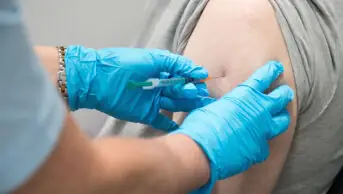
Mariusz Burcz / Alamy Stock Photo
More than 350 people have now signed up to be part of the ‘Platform adaptive trial of novel antivirals for early treatment of COVID-19 In the community’ (PANORAMIC).
The National Institute for Health Research-funded trial, which is run by the University of Oxford and started on 8 December 2021, will first investigate whether oral antiviral molnupiravir could help clinically vulnerable people diagnosed with COVID-19 recover sooner and prevent them having to attend hospital.
To be eligible for enrolment onto the trial, participants must be aged 50 years and over, or aged 18–49 years with underlying health conditions that make them clinically more vulnerable. All participants need to have recorded a positive PCR test within the past seven days and to have felt unwell with COVID-19 symptoms within the past five days.
Once registered on the trial, participants will be treated in the community and offered either an antiviral treatment in addition to standard NHS care or receive standard NHS care alone.
According to the patient information leaflet, those randomised onto the second group “will receive standard NHS services available as normal” but will also be followed up by trial researchers.
As of publication on 17 December 2021, there were 352 participants registered on the trial.
On 16 December 2021, Chris Butler, professor of primary care in the Nuffield Department of Primary Care Health Sciences and chief investigator of the trial, said in a press briefing that antiviral drugs are “likely to have their biggest effect” in the early stages of a COVID-19 illness, “hence the emphasis on getting the drug to people within five days of their symptom onset”.
“So as soon as we have a positive PCR test and as soon as somebody is symptomatic, we’re hoping that they will get in touch with us or we will be able to reach out to them so that they can get the opportunity to participate,” he said.
Mahendra Patel, pharmacy, diversity, and inclusion lead for PANORAMIC, said that the study hoped to recruit 10,600 participants, with each participant monitored by trial researchers for 28 days.
“We need an urgent, rapid, high priority drive for people to come forward; to help as quickly as possible in establishing if this drug works in our community, which is vaccinated: because earlier results have been in an unvaccinated population,” he said.
“We want to see how effective it is within the population that’s been vaccinated. But also: how does it work with Omicron? The sooner we get that evidence, the sooner we can establish where molnupiravir lies for the treatment of COVID-19 as part of the care that we provide within the NHS to those people who are most vulnerable, and are more likely to become seriously ill if affected by COVID-19.”
Pharmacies, GP surgeries and other healthcare settings are helping to identify suitable participants and inviting them to take part. Potential recruits can also self-register through the PANORAMIC website.
The launch of the PANORAMIC trial came ahead of the start of an NHS-led drive on 16 December 2021 to provide molnupiravir to patients at very high risk of hospitalisation or death from COVID-19.
Also speaking at the press briefing, David Lowe, consultant clinical immunologist at University College London, said that this NHS-led service predominantly identifies patients “who have a significant immune deficiency and are therefore unlikely to respond well to vaccines”.
“They’ll be contacted to be told that if they develop COVID-19, they will be eligible for treatment on an outpatient basis.”
From 16 December 2021, NHS England began offering molnupiravir and neutralising monoclonal antibodies to patients outside of hospitals through specially set up COVID-19 medicines delivery units.
Any questions about antivirals?
Let us know if you have any questions about antiviral treatment for COVID-19 and we will get experts to answer them. Please email us your name, place of work and your question to editor@pharmaceutical-journal.com.
Read more: Everything you need to know about the COVID-19 therapy trials


